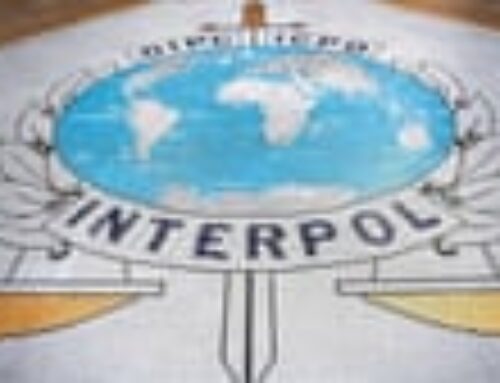At Brussels airport, customs staff are digging into suitcases and cooler boxes full of charred meats and fish. There are boxes of flies with shrivelled dead caterpillars and juicy live ones. It is 6am, and they are checking all hold luggage from four morning flights – three from Africa and one from China – in an attempt to stem the flow of illegal meat from wildlife making its way into Europe via this major transit hub. There is a lingering smell of dried seafood.
Staff here are used to finding all kinds of creatures in baggage, from a 1.5-metre basking shark folded inside a box to a whole smoked monkey. But most meat comes dried, smoked, charred and chopped, so it is hard to identify it. In some cases, that’s probably the point. A hunk of meat being confiscated could be from a cane rat, catfish, monkey or pangolin – or it could just be a bit of beef.
Researchers estimate 3.9 tonnes of bushmeat a month is smuggled through this airport, including bits of elephants, pangolins and crocodiles, and demand for bushmeat has become one of the main drivers of wildlife trafficking. The trade in some species has created a “significant extinction threat” to some wildlife populations, particularly in Asia, Africa and South America, according to the first global assessment of hunting’s effect on terrestrial mammals.
Millions of people around the world rely on bushmeat as a source of local protein. However, it is increasingly being funnelled into a lucrative organised trade, providing luxury goods to an international market which pushes prices up.
A recent Europe-wide effort to tackle it, Operation Thunder, resulting in more than 2,000 seizures of endangered animals and protected timber during a law enforcement crackdown in October. The illegal wildlife trade is one of the most profitable areas for organised crime and is continuing to grow, Interpol warns. It also poses a significant risk to human health.
-
Customs officers examine a passenger’s luggage at Brussels airport
Researchers tracking personal baggage through Paris’s Charles de Gaulle airport have found entire sheep and calves wrapped in plastic and placed in holdalls, which had apparently been slaughtered just before boarding.
These were not protected species, but the movement of animal carcasses and products risks the creation of novel infectious diseases, as well as spreading existing ones, such as mpox (formerly known as monkeypox) and Ebola. There is no easy way of testing for pathogens on these bits of meat in an airport, even if officials knew which pathogens to look for.
“Covid was a warning shot,” says Sandrella Morrison-Lanjouw, a biosurveillance researcher from Utrecht University. “Contaminated meat from a wet market in Africa can be in Europe in less than eight hours, but we won’t find what we are not looking for.”
-
Customs officers check all hold luggage and confiscate a suitcase of African catfish. Meat is often concealed under dried fish or bags of vegetables and herbs
The scale of the illegal bushmeat trade is unknown, but scientific reviews suggest it is becoming increasingly commercialised, with more demand in overseas cities and urban centres as well as rural areas. Within Africa, reports from countries including Angola and Nigeria suggest there is increasing demand in big cities, with more people dependent on the trade for income.
As customs staff dig through the bags in Brussels, they confiscate all meat, as well as all fish that is not dried or gutted, free from insects and weighing less than 20kg (44lb).
Usually, confiscated meat is incinerated, as it is too costly and complicated to find out what these animals could be. This makes it impossible to provide scientific data on the extent of this trade via airports.
Authorities say some individuals fly in every week, with as much as 80kg of luggage. “For them, it’s an income,” says Maarten Weyters, team leader of Brussels airport customs checks. Most planes do not undergo full checks on the baggage, as this one has.
-
An expert from the Federal Agency for the Safety of the Food Chain inspects a piece of fish
In 2023 Weyters says, his team found 56 items of wildlife listed as endangered by the Convention on International Trade in Endangered Species of Wild Fauna and Flora (Cites), including pangolin, coral and crocodile. “I think most of them know it’s illegal,” Weyters says. “It’s also illegal where they live.” Today is relatively quiet: 10 seizures, adding up to 75kg of contraband wildlife.
Meat is found concealed under dried fish or bags of vegetables and herbs, and is often wrapped in black binliners. In many packages, the meat is already decaying, dotted with maggots and flies. These can pose a risk to biodiversity, introducing insect pests and potential pathogens to new environments.
-
From left: a cooler box is checked, while an official explains to a passenger which products are allowed into the EU
“Very little is known about the true volume of this meat,” says Morrison-Lanjouw, who written extensively on unregulated meat imports. The level of transparency at Brussels is unique, she says – very few airports in Europe will let researchers study what is happening. The issue is a “biosurveillance blind spot for the EU”, she adds.
-
Biosurveillance researcher Sandrella Morrison-Lanjouw, centre, prepares to test meat found in luggage
A key problem is identifying the meat quickly, so law enforcement can intervene. To get around this, researchers take a portable DNA testing unit to the airport – the first time such a device has been used to test bushmeat in a European airport, they believe.
The technology needs to be as rapid and simple as possible, says Emily Patterson, a PhD researcher in forensic DNA analysis at Leicester University. “The ideal scenario is someone with minimal training could do all of this.”
-
Researchers Emily Patterson and Sandrella Morrison-Lanjouw in hazmat suits as they prepare to test some of the confiscated meat
Wearing hazmat suits, Patterson and Morrison-Lanjouw prick meat samples and pass them through the MinION, a machine developed by an Oxford University spin-off to extract DNA. The kit can fit inside a suitcase and identify samples within eight hours.
One man casually announces he is carrying duiker, an African antelope, including one 500g joint that he says he could sell for $30 (£24). The DNA sequencing test shows that the two species he had were bay duiker and Maxwell’s duiker, both species listed in Cites’ Appendix II, meaning trade must be controlled to avoid over-exploitation.
The bay duiker is listed as near threatened by the International Union for Conservation of Nature and Natural Resources, though Maxwell’s duiker is classified on its red list as being of least concern.
However, both populations are decreasing and the demand for bushmeat is one of the factors driving their decline. Pork, beef and north African catfish were also identified by the scientists as being in the luggage. Other results came back inconclusive – this could be because the animal had not yet been added to the GenBank genetic sequence database.
-
Researchers unpack, examine and DNA test meat from a traveller’s suitcase. The test later reveals the meat was beef
The bushmeat found by the scientists represents only a tiny fraction of the trade, which tends to favour delivery by air or by post.
“[Flights are] the fastest way to enter, while seaports normally require longer transit time,” says Anne-Lise Chaber, a researcher at Adelaide University. A study she led in 2010 found that nearly one in 12 passengers searched on flights from west and central African countries were carrying bushmeat. Commodities that do not need to be transported so urgently – such as pangolin scales or the bones of tigers and lions – are more likely to be in shipping containers.
It is likely that what is happening in Brussels and Paris is occurring in airports all over Europe. It shows if you want to find illegally trafficked wildlife, it is easy to do, but few people are looking. “It’s coming in everywhere,” says Morrison-Lanjouw.
From Brussels, meat that is not caught by customs will make its way to the markets in European cities such as Paris, where traders can get double the price of supermarket meat, Chaber has found in previous research – showing consumers are willing to pay premium prices for these products.
-
Many pieces of meat are infested with maggots or flies. Any containing insects will be discarded.
Chaber says some customers believe it is healthier to eat bushmeat, while others some find it tastier. “We have to work with the community and see what could replace bushmeat,” she says. “I’m not against consumption of bushmeat locally, I am against the international trade.”
In 2008 she went around markets in Paris posing as a potential customer to find out how simple it would be to buy bushmeat. “It was very easy,” she says. In the years since, however, little has changed to stop the flood of meat into European markets – and the accompanying declines in wildlife. “The truth is, I know that it’s still very easy.”




